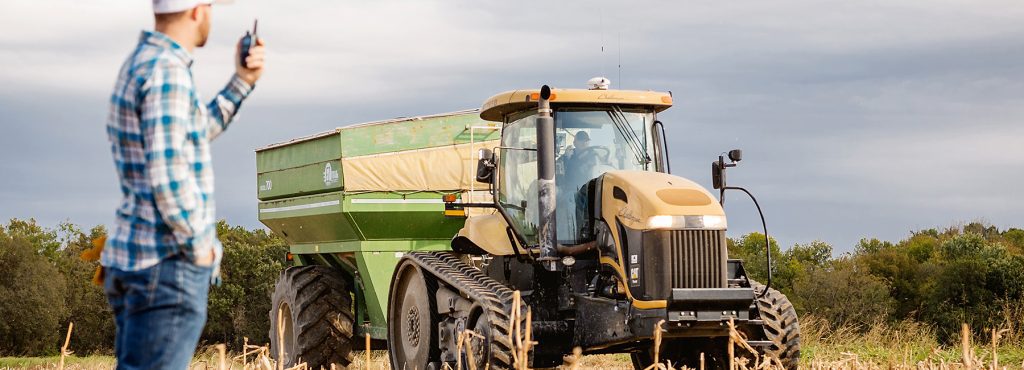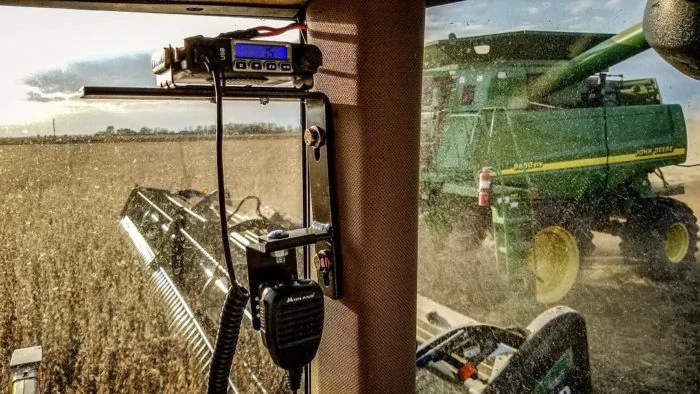

Two-way radios. Business-band radios. Cell phones. CB radios. Texting. Hand-and-arm signals when backing up the tractor to the planter. How do you talk to each other on the farm? Ok, not that communication. Good old-fashioned talking to each other on the farm communication.
Families that farm together, that run the farm business together, that own the farm together should be communicating with one another just like any successful business partnership should. A cohesive unit where each person knows what the other is always doing. The partnership functions as a well-oiled machine where each partner knows exactly the challenges before them, the plan of the business unit in order to tackle the challenges, and the desired outcome. At the end of the year, sit back and congratulate each other. Celebrate Christmas together. Pat each other on the back and look forward to an even better year next year.
Is this how you would describe how it is on the farm with your son, or your dad, or your brother, or your cousin(s) or brother-in-law? Or any combination of the above?
I get to meet a lot of farmers that farm with their family members. We did some informal surveying of how well they get along with one another. We put a few farmers through a practical exercise where each wrote down on a piece of paper what they thought the strengths and weaknesses of their counterparts were. The recurring theme was that communication needs improvement.
As I said above, good internal communication on the farm should be no different than inside an operationally fast-paced business in a major population area. But that is not a good way to describe it because maybe if a couple of business owners on Wall Street have a falling out, they can easily go their separate ways. Maybe some lawyers get involved. It is just business, right? No big deal. The stakes are way higher for families that farm together because spouses and children can wind up right in the middle of it. It is a true family business and if the next generation does not want to carry it on because they watched their dad and uncle at each other’s throats for years – then that is not good. We should be inspiring the next generation to pursue farming – the profession that George Washington called the “most healthful, most useful, and most noble employment of man.”

So, in order to improve communication on the farm, please consider starting with these three steps:
A Morning Meeting
This is easy. It can be done over the hood of a pickup or at the bench in the shop. It can be simple and quick, but it should be a daily thing. Lay out the plan for the day, talk about what went well yesterday and what needs to be followed up on. Then if there are any major long-term strategic things to address, do that too. But do not get bogged down with the strategic level stuff at the daily huddle. Focus on the daily tasks of the operation. One foot in front of the other. The main thing is to set the tone for the day, but also use it as a regular team-building exercise. Take a second to find out what is the latest with the kids or after a day or two off, talk about what each of you did over the weekend.
Personal Accountability
Just let each other know where you are and what you are always doing. Be accountable to one another. Keep each other informed. I am willing to bet that most conflict or resentment comes when one does not think the other is working hard enough or shouldering their share of the load. When you keep everyone else informed of where you are and what you are doing, you are exhibiting that you are personally accountable to those whose success is tied to your own.
Address Differences Immediately
This is a nice way of saying “nip it in the bud.” Conflict, that is. I mean face to face addressing a real or perceived conflict. Not a text, not a passive-aggressive silent treatment type of weird body language hint. It needs to be direct. It’s: “Hey, I don’t think we are on the same page on this, let me tell you what I’m thinking, and I want to better understand where you are coming from.” Be aware, your willingness to compromise at the result of this situation must be better than the current example of compromise (or lack thereof) in Washington D.C., for instance. But that should make it all the easier!
Most importantly, always assume good intentions. Remember that everyone wants the same thing in the end.